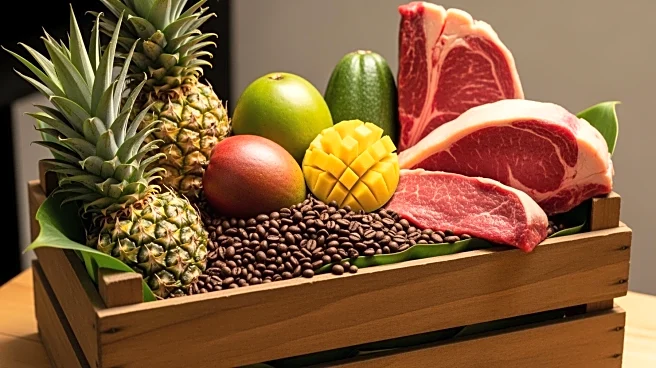What's Happening?
Brazilian Vice President Geraldo Alckmin announced that despite recent U.S. policy changes, Brazilian exports such as coffee, beef, and tropical fruits will continue to face a 40% tariff. This follows President Trump's decision to remove some import taxes
in an effort to boost domestic production and the U.S. economy. Initially, Brazil was subjected to a 10% tariff, which was later increased to 40% in July, partly due to political tensions surrounding the trial of former President Jair Bolsonaro. While some products like orange juice will now have zero tariffs, the additional 40% tariff remains on key Brazilian exports. Alckmin expressed that while Trump's latest decision is a positive step, it still leaves a significant tariff burden on Brazil.
Why It's Important?
The continuation of high tariffs on Brazilian goods has significant implications for U.S.-Brazil trade relations and economic dynamics. These tariffs affect the cost of imported goods in the U.S., potentially leading to higher prices for consumers, particularly in the beef market. The tariffs also impact Brazilian exporters, who face reduced competitiveness in the U.S. market. The political undertones of the tariff imposition, linked to Bolsonaro's trial, highlight the complex interplay between international trade and domestic politics. The decision to maintain tariffs could strain diplomatic relations, although recent dialogues between President Lula and President Trump suggest potential for future negotiations.
What's Next?
Future discussions between U.S. and Brazilian officials may lead to adjustments in trade policies. Brazilian President Lula's recent meeting with President Trump in Malaysia indicates ongoing diplomatic efforts to resolve trade tensions. Additionally, U.S. Secretary of State Marco Rubio's meeting with Brazil's Foreign Minister Mauro Vieira suggests continued dialogue. The Brazilian coffee industry, represented by Pavel Cardoso, plans to monitor the situation closely, aiming to ensure competitiveness and predictability for Brazilian exports. The outcome of these discussions could influence future tariff policies and trade agreements.
Beyond the Headlines
The tariff situation underscores broader issues of trade protectionism and its impact on global economic relations. The political motivations behind tariff impositions, such as those linked to Bolsonaro's trial, reveal how domestic political agendas can influence international trade policies. The ongoing negotiations and potential trade deals could reshape U.S.-Brazil economic interactions, affecting industries and consumers in both countries. The situation also highlights the importance of diplomatic engagement in resolving trade disputes and fostering international cooperation.
















